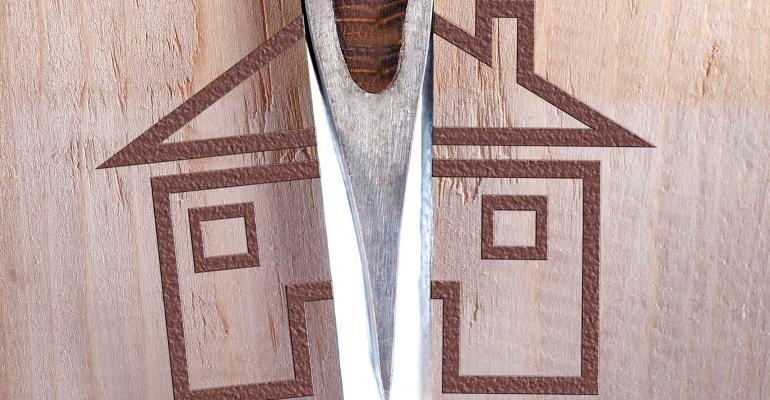Whether it’s for convenience, necessity or expediency, some of your benevolent older clients might be tempted to add their adult child’s name to the deed of the clients’ home; but doing so can create some expensive negative consequences for both the client and the child, which could far exceed any benefits generated by the move.
Here are some reasons your clients should think twice or three times before putting their kid’s name on the deed.
No Takebacks
Simply adding a child’s name to the deed (often via a “joint tenancy with rights of survivorship” or JTWROS designation) constitutes an irrevocable gift of half the value of the home.
The “WROS” means that once one of the members/owners dies (often the older parent), the surviving member (in this case the child) inherits the other member’s share, skipping the potential headache and hassle of probate, and superseding any contradictory language that might be contained in the parent’s will.
Even if that’s the ultimate goal of the parent, it’s the “JT” part of the designation that can really cause problems.
Once on the deed, under JTWROS, the child owns half of the asset. Therefore, the parent can’t sell the whole house without the permission/agreement of the child—only the parent’s remaining share.
As such, the child, also, can sell their interest in half of the house to any party, without the knowledge or consent of the parent.
Unforeseen and Unfortunate
Even if the child would never do such a thing (at least, while the parent is alive), other aspects of their lives can directly and negatively affect the parent’s ownership of the home.
If the child is (or becomes) married and then the marriage ends, the half-share of the home could be considered a marital asset, and would be subject to division in the divorce.
The child could also incur lawsuits or bankruptcy proceedings that, if decided against the child, may attach the value of the child’s home ownership as a source of funds to remedy a lost judgment.
Finally, the child’s share of the home may preclude them from qualifying for needs-based government or educational financial assistance.
Medicaid Maneuver?
Some older homeowners believe that by gifting half of their house to a child, they can qualify for Medicaid nursing home assistance sooner, while still keeping that portion of the house in the family (and for the child).
That’s unlikely, however, as if the homeowner applies for Medicaid, there will be a five-year “lookback” period that could disallow any asset transfers made during those five years—including the share of the house.
Mortgage Mess
If there is a mortgage on the home and the owner is attempting to add a new name to the deed, the homeowner might need to consult the lender first.
The lender may have the right to exercise a “due-on-sale” clause, meaning the mortgage then needs to be either paid in full or refinanced.
However, “transferring the property to children” is an exception to the due-on-sale clause, and should be permitted by the lender without changing terms of the mortgage.
That said, adding a child to the deed now means that if the parent attempts to obtain a new mortgage, home equity loan or home equity line of credit, lenders may require the child’s income and credit score to be considered as well.
If the parent needs to obtain a reverse mortgage in the future, the resulting expense and ramifications may make it more difficult for the child to afford to buy and remain in the home after the parent is gone.
Seething Siblings
Often parents are motivated to give partial ownership of a home to a child because the kid doesn’t have the income or assets necessary to pay for his own place and may even already be living at the home.
If there are other children in the family, they may resent the parent for handing over half of a house that may be worth several hundred thousand dollars to a “layabout” sibling.
Plus, by definition the relatively indigent child likely will need to be bequeathed cash to pay for taxes, insurance, upkeep and other living expenses above and beyond what the child can earn.
Unless the client has significant other assets that can be divided equally among the other children, they may come to resent the gift, the giver and the recipient for eternity.
More Capital Gains Liability
Under today’s laws when a homeowner passes away, the cost basis of their home (like most other assets) is “stepped up” to the value of the date of the owner’s death.
But if the client adds a child’s name to the deed while the client is alive, the cost basis for the child’s half of the home remains what the client originally paid for it–even after the client dies.
Then if the child wants (or needs) to sell the place in the future, they may be on the hook for a significant capital gain tax bill—which, depending on the home, could cost several hundred thousand dollars.
Not Your Problem
There can be numerous tax, legal, borrowing and estate planning issues when adding a child’s name to a home, all of which are likely beyond the average advisor’s area of professional expertise.
So after you have explained the potential problems of doing so to your clients, suggest that they consult a qualified lender, attorney and accountant to highlight specific issues and expenses and offer some other more palatable alternatives.





